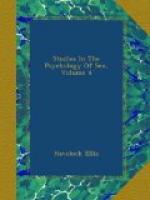in Baudelaire’s own imaginative and emotional
life the sense of smell played a highly important
part; and that, in his own words, odor was to him what
music is to others. Throughout Zola’s novels—and
perhaps more especially in La Faute de l’Abbe
Mouret—there is an extreme insistence
on odors of every kind. Prof. Leopold Bernard
wrote an elaborate study of this aspect of Zola’s
work[44]; he believed that underlying Zola’s
interest in odors there was an abnormally keen olfactory
sensibility and large development of the olfactory
region of the brain. Such a supposition is, however,
unnecessary, and, as a matter of fact, a careful examination
of Zola’s olfactory sensibility, conducted by
M. Passy, showed that it was somewhat below normal.[45]
At the same time it was shown that Zola was really
a person of olfactory psychic type, with a special
attention to odors and a special memory for them;
as is frequently the case with perfumers with less
than normal olfactory acuity he possessed a more than
normal power of discriminating odors; it is possible
that in early life his olfactory acuity may also have
been above normal. In the same way Nietzsche,
in his writings, shows a marked sensibility, and especially
antipathy, as regards odors, which has by some been
regarded as an index to a real physical sensibility
of abnormal keenness; according to Moebius, however,
there was no reason for supposing this to be the case.[46]
Huysmans, who throughout his books reveals a very
intense preoccupation with the exact shades of many
kinds of sensory impressions, and an apparently abnormally
keen sensibility to them, has shown a great interest
in odors, more especially in an oft-quoted passage
in A Rebours. The blind Milton of “Paradise
Lost” (as the late Mr. Grant Allen once remarked
to me), dwells much on scents; in this case it is
doubtless to the blindness and not to any special
organic predisposition that we must attribute this
direction of sensory attention.[47] Among our older
English poets, also, Herrick displays a special interest
in odors with a definite realization of their sexual
attractiveness.[48] Shelley, who was alive to so many
of the unusual aesthetic aspects of things, often
shows an enthusiastic delight in odors, more especially
those of flowers. It may, indeed, be said that
most poets—though to a less degree than
those I have mentioned—devote a special
attention to odors, and, since it has been possible
to describe smell as the sense of imagination, this
need not surprise us. That Shakespeare, for instance,
ranked this sense very high indeed is shown by various
passages in his works and notably by Sonnet LIV:
“O, how much more doth beauty beauteous seem?”—in
which he implicitly places the attraction of odor
on at least as high a level as that of vision.[49]




